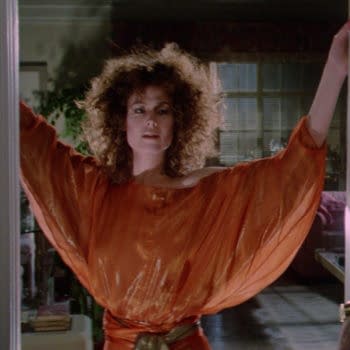Posted in: Bill Watters, Movies, Review | Tagged: Bill Watters, film, movie, opinion, Review, tv
Everyone's a Critic: How do Ratings and Reviews Work?
I've been often asked about what my review rating scores mean. What's a 6 vs a 7? Is a 5 a recommend thing or not? Why are critics so negative all the time? I wanted to take some time this holiday weekend to come up with some of my own answers to the questions.
One of the panels I've been fortunate enough to be a part of and nurture over the last several years at various conventions is "Everyone's a Critic: Being a Journalist in an Online Age." During those sessions, sharing the forum with a lineup of critics, we talk about going from a fan posting about things they love or hate, to being ostensibly professionals who strive to inform their readers about how those things fit into the bigger picture.
A Critic or a Fan with an Opinion?
What makes someone somehow entitled to presume that they can say what's good versus what's bad about any particular piece of art? Additionally, how can they pivot from someone who's just regurgitating a summary of what they just read, watched, or listened to and throwing a random number score against it, to someone who is striving to engage in actual criticism.
A common impression of what a critic does in their work is often one of the baser definitions of the word: "the expression of disapproval of someone or something based on perceived faults or mistakes." But the more appropriate goal which criticism means is: "the analysis and judgment of the merits and faults of a literary or artistic work."
The difference may seem subtle, but there is far more of a disparity between the two. While both extremes may talk about how something might be bad, but the latter approach is obliged to set into context the "why" of it. Something is great, okay, fine, but why?
Consider something being described as a guilty pleasure. For someone who has not analyzed the why of it, it might be described as guilty because they like something, but cannot formulate a reason as why they do. For a critic, they might have enjoyed something, but they should be able to clearly express the reasons behind it. It might be purely a personal reaction, but they should still be able to break down the elements which connected and spoke to them.
Reviews which someone is likely to encounter today range the gamut from the rehashing of the summary and a score, to long form deconstructions of how a film or show fits into the overall contemporary landscape and its influences. Unfortunately, the majority tend to fall more into the former, but an ever-increasing number are shifting towards the latter.
The former of these are of little use beyond the score, since a prospective consumer can always watch a trailer and know what something is about. They may as well never click beyond the listing of critic reviews on Rotten Tomatoes, since the important part from that reviewer is no more than the single data point.
The latter will tend to find themselves building an audience who [hopefully] connect with that critic's voice. Their readers will become familiar with his or her perspectives, and will often seek out their reviews.
Is there anything more subjective than asking someone if they liked a particular television show, movie, game, or really anything else that is experiential in nature? Every person brings with them their own particular perspectives on what they like, their background, their tastes, and as such different things will speak to them.
Some people love horror films, while others love romantic comedies, and yet some others like neither and others like both. In the end, what a person likes is entirely up to them. When writing for a consumer, the goal is to frame the perspective and analysis in a way that the readers (or viewers) can relate to and understand. If you drop the types of terms that would likely only resonate with 3rd-year film students, but the audience is more casual, you may lose engagement. Connect with an audience, and possibly help educate and elevate the readers appreciation of the art form.
Rating systems: stars, points, painted rocks.
Including a rating has long been part of reviews, and there are various perspectives on the practice. Some critics express that including a score is far too reductive. San Francisco Chronicle Restaurant critic Soleil Ho opened her tenure in the position by announcing that her reviews would not include a stars rating system. Readers were surprised, but she expressed that they would have to read her review in full and come to their own conclusion. Rather than just seeing, "3 stars out of 5", and moving on without taking in what she had to say about it.
This kind of approach is very much in the minority, and in the end, it does fall to critics to take everything they've amassed about what they are reviewing and boil it down to some number. But keep in mind, there's often more to it than just a straight up expression of a point rating. There may be some merit, but only to a particular subset of the audience, or for one actor's performance, but the whole didn't hold up. Maybe it was great, but something really ran afoul in the execution.
When looking for critics to read, don't just look for those who have a track record of agreeing with you on movies, because those are the films you'll already gravitate towards. Look for those who will expose you to new ideas and new perspectives. It's not about agreeing with someone, but rather understanding how someone else sees something and why. Then it's for you to make your own decision.
Yeah, But What Do those Ratings MEAN?!
For myself, I use a 10-point scale. 5-point is somewhat more typical, but I like having a bit more of a gradated range to work with. Below is a general breakdown of what would merit any one of those scores, and some examples along the way.
1 Star
It takes a special type of horrible to garner a rating of a 1 from me. It will be generally something that goes out of its way to offend or insult the viewer. It's a waste of the hard drive space it takes up and deserves to be lit on fire and put through a shredder. If it's based on an earlier film or series, it will be so bad that it makes you reconsider any fondness you might have had for the original. It's bad execution of a bad script with bad actors. This doesn't mean low-budget, this means that whatever budget it did have, it was wasted. Examples of a 1-star recently would be the 2015 Vacation movie, Catwoman, or Independence Day: Resurgence.

2 Stars
This is the kind of film that's generally going to have issues on most fronts. Bad performances will only take a film down so far, to get to a two or lower, it'll have to have significant structural and script issues. It might be a genre film that doesn't actually deliver on its promise (like The Nun, which for a horror film, forgot to include any horror). Or a remake that fails to understand its roots, such as the American remake of Death at a Funeral.
3 Stars
Three is where you come out of the theater realizing you'll never get those two hours of your life back. The film might have been advertised one way, but in reality, it was something very different, and not in a good way (The Road, Collateral Beauty). It's a sequel that forgot the charm or characters of the earlier installment (Pitch Perfect 2, Speed 2, Caddyshack 2). It's a poorly made film which doesn't have the grace to have some form of accompanying charm (the difference between so bad it's good, and it's just bad).

4 Stars
A four is something that is probably best to wait until you stumble across it on Netflix (though it'll probably wind up on Hulu first). There's nothing problematic with the film, it's just not engaging. The performances have no heart, there's nothing that you get out of the experience that you didn't get from watching the trailer. Often films that fall in this range had great trailer hooks, but failed to deliver. This would also be the class of films where by the time you've gotten home you've already forgotten most of it. Velvet Buzzsaw, Asher, The House with a Clock in its Walls are all examples of films that, while just didn't stick with you as far as getting back to the car.
Most capably handled films will wind up in the 5-7 range.
5 Stars
A five is still a movie that if asked if I would go see in the theater, I would probably say yes, but I wouldn't try to talk someone into seeing it. It might be something to see if it's in the midst of a franchise or a series, for completion's sake, or if there's an actor that you like, otherwise. But it's not an opening night must-see.
6 Stars
The film for a six needs to have generally delivered on the expectations going into the film. You probably won't regret spending the price of admission for the ticket (however if you add in the cost of popcorn, candy, and drinks things might get a bit sketchy). Movies that are generally fun and satisfying, but perhaps are impaired by structural flaws or a bad performance can land in this range. Also, a more pedestrian film might be salvaged by an outstanding performance by an actor who swings for the fences and gives it everything.
From 7 on up, the review itself should include justifications on the perspective about why the movie should warrant be considered in these lofty levels.
7 Stars
A seven is when we start getting into the range of what would be considered a good to really good film. Here we're going to need most of the performances to land, the story to be coherent, and the direction to be sure-footed. It can't just be a retread of previously-worn paths to get here. I Kill Giants, Atomic Blonde, Pursuit of Happiness are all examples of 7's.
8 Stars
Eights range really good to great. From here on out they will often wind up having individual performances which will be nominated repeatedly during award season (The Destroyer). There will often be either entirely a new spin on an existing trope, or a new expansion in an existing franchise (many of the later Harry Potter films).
9 Stars
Nines are your normal best. The performances are top notch, it's engaging and enlightening, it delivers more than you expected going in, and there's not a lot of fat hanging on the story. These are the movies that excite you to go back to see again and again. It'll help you discover a love for something new, or throw you into being a lifelong fan of a director, writer, or actor. Gravity, Up, Get Out, and Iron Giant are all 9s.
10 Stars
A perfect ten is a unicorn. It's generally the rarest of scores. It will generally be something that is genre-changing. You may not need to see it on opening night, but it'll be something to call your friends together and make an outing to see it on a big screen. It's the sort of film that when you find out a co-worker hasn't seen it yet, you'll make a full-throated pitch as to why they need to drop everything and see it that weekend (if not sooner). Any one thing will not elevate a film to this level, such as an actor's performance or a script. Everything will have to be firing on all cylinders, and even then, taking something to a wholly new level and making an audience feel in a way that they hadn't expected. Mad Max: Fury Road, Wall-E, and The Wrestler, have gotten 10's from me since 2000. Other classics of this tier would include Blade Runner, The Godfather, and Apocalypse Now.
Some last thoughts:

It should be noted that there is nothing at all budgetary that precludes a film from any particular rating. Shoestring budget indie films can just as readily be an 8+ as can a blockbuster – the only difference is that the indies will have to lean into what they do have – the performances, the script, and the sure-handedness of direction. By that same token, and has been so often encountered, there are plenty of 100-plus million dollar productions that easily fall below 3's.
Remember that what you love is always your own business. If you liked Ishtar, great- nobody can tell you that your enjoyment of it is wrong. They may choose to present their case of why they disliked it and that may in turn change your perspective. Just remember turnabout is neither can you tell someone else that they're wrong. No matter what the general consensus is of a film, somewhere there are people who it meant something to – it touched them in a way that moved them. In the end it's art, and art is, by its nature, subjective.
For us who try to present a case for something as a critic, we should be held to the task of not just throwing a number against a wall, but capturing and presenting why we came to that conclusion. You're taking the time to read our few hundred words, so we owe it to you to help entertain, to inform, and where possible, educate.
On the topic of critics who really do excellent deep dives into a robust academic dive into the study of film and criticism, here's a few individuals that I highly recommend searching out. There are many, many more, but here's some to start in with:
- Bob Chipman's Really That Good series.
- 80s All Over podcast series.
- 4:30 Movie podcast series.









!['Rocketman' Soars With Warts and All Elton John Story [Review]](https://mlpnk72yciwc.i.optimole.com/cqhiHLc.IIZS~2ef73/w:350/h:350/q:75/rt:fill/g:ce/https://bleedingcool.com/wp-content/uploads/2019/01/rocketman.3-350x350.jpg)







